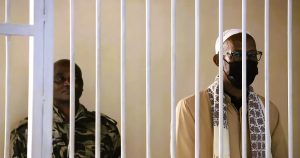Kenyan and Ugandan activists still held in Tanzania
3 min read
Detention of Kenyan and Ugandan activists in Tanzania sparks diplomatic tensions and raises human rights concerns.
A diplomatic standoff is intensifying in East Africa following the detention of prominent Kenyan activist Boniface Mwangi and Ugandan human rights lawyer Agather Atuhaire in Tanzania. The two were taken into custody by Tanzanian immigration authorities after traveling to observe a high-profile court hearing involving Tanzanian opposition leader Tundu Lissu.
Mwangi, a well-known voice in Kenyan civil society, and Atuhaire, a vocal advocate for human rights in Uganda, had joined a broader East African delegation aiming to monitor Lissu’s trial. Lissu, who faces treason charges, has long been a critic of Tanzania’s ruling establishment. His supporters, both domestic and international, claim the charges are politically motivated and part of a larger effort to silence dissent in the country.
The Tanzanian government, however, has pushed back strongly against this narrative. President Samia Suluhu has issued a warning against what she describes as “foreign interference” in the country’s internal affairs. Her comments follow reports that other Kenyan civil society leaders were previously denied entry into Tanzania when attempting to attend the same court proceedings.
With Mwangi and Atuhaire still held in custody, concerns over the treatment of foreign observers and human rights defenders have grown. Little information has been released about their legal status, reasons for their detention, or whether they will face formal charges. The silence from Tanzanian authorities has drawn criticism from regional and international rights organizations, who see the move as a dangerous precedent.
“This is a worrying development,” said a spokesperson from a leading East African civil liberties group. “Observers and activists should not be criminalized for attending a public court hearing. Tanzania’s actions threaten regional cooperation and basic principles of justice and transparency.”
The situation has already begun to strain diplomatic ties between Tanzania and its neighbors. Kenyan officials have reportedly sought clarification from Tanzanian counterparts, but no official resolution has been reached. Uganda, too, is monitoring the developments, particularly given the involvement of a Ugandan national in the controversy.
For Tanzania, the backdrop is a politically charged environment where opposition figures frequently clash with state institutions. Tundu Lissu’s arrest has reignited memories of past crackdowns on dissent. He survived an assassination attempt in 2017 and spent years in exile before returning to run for president in 2020. His current arrest is seen by many as yet another attempt to sideline him from political life.
Despite calls for transparency, Tanzanian authorities remain tight-lipped. State media has provided minimal coverage of the arrests, while independent journalists report restricted access to information surrounding the case. Observers say this lack of openness undermines the credibility of the judiciary and raises broader concerns about human rights in the country.
Activists across the region have begun mobilizing online, demanding the release of Mwangi and Atuhaire using hashtags and social media campaigns. Protest statements have also been issued by Kenyan and Ugandan civil society organizations, condemning the detentions and urging swift diplomatic engagement.
“This isn’t just about two individuals,” said a Nairobi-based civil rights lawyer. “It’s about whether East Africans can safely participate in democratic processes across borders. If observing a court hearing gets you detained, what does that say about freedom of movement and speech in our region?”
As regional governments weigh their response, many await word on the fate of the detained activists. The case is rapidly becoming a litmus test for East Africa’s commitment to democracy, transparency, and the rule of law.






